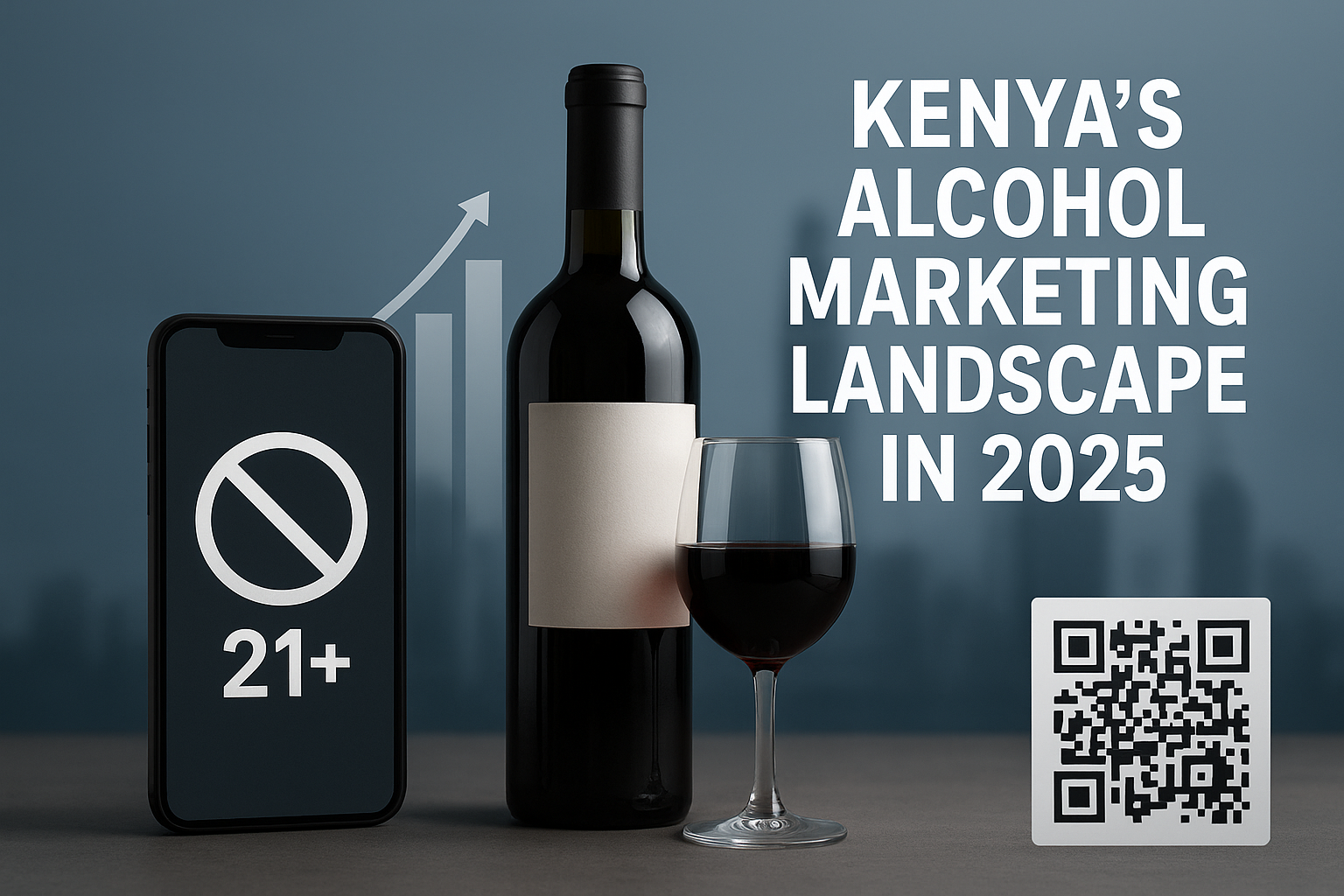Kenya 2025 Alcohol Marketing Revolution: Innovative Trends, Digital Strategies & Regulatory Insights
The alcohol marketing landscape in Kenya is undergoing its most dramatic transformation in decades. With the 2025 NACADA regulations reshaping how brands can promote, distribute, and engage consumers, the stakes have never been higher. While restrictions on digital advertising, influencer marketing, and online sales present challenges, they also open the door to more innovative, consumer-focused, and compliant strategies.
For brand managers, marketing agencies, beverage companies, and startups, success in this evolving landscape requires understanding regulatory changes, adapting to consumer shifts, and embracing creative approaches to brand growth.
Understanding Kenya’s 2025 Alcohol Marketing Regulations
The National Policy on the Prevention of Alcohol, Drugs, and Substance Use (2025) is a game-changer. Its goal: to curb alcohol abuse, particularly among youth. Its impact: a sweeping overhaul of how alcohol brands operate in Kenya.
Key restrictions include:
- Ban on online advertising and influencer marketing – no more celebrity endorsements or social media campaigns.
- Ban on online sales and deliveries – cutting off a key growth driver for urban consumers.
- Stricter advertising controls – including watershed bans (5 a.m.–10 p.m.), billboard restrictions near schools, and mandatory health-focused messaging.
- Minimum drinking age raised to 21 – shifting the demographic focus.
For businesses, this means traditional promotion models no longer work. Compliance is non-negotiable, but innovation is essential.
Consumer Shifts Reshaping the Alcohol Market
Despite regulatory hurdles, Kenya’s alcohol market is growing, driven by urbanisation and rising disposable incomes. The market is expected to surpass US$4 billion by 2029, with consumers increasingly seeking premium and craft products.
Key consumer trends include:
- Premiumization: Shift from volume to quality, with higher demand for premium spirits, wines, and craft beers.
- Mindful Drinking: Health-conscious consumers are opting for low-alcohol or alcohol-free beverages.
- Authenticity & Transparency: QR codes, storytelling, and sustainable practices are becoming trust-builders.
This evolving consumer base provides opportunities for brands that align with health, experience, and cultural authenticity.
Innovative Marketing Strategies for Success in 2025
Responsible Consumption Narratives
With lifestyle glamorization banned, brands must pivot to education, storytelling, and responsibility. Campaigns can highlight sustainability, craftsmanship, wellness, and cultural heritage, aligning with consumer expectations and policy requirements.
Experiential Marketing & On-Ground Activations
Immersive experiences are now the new battleground for loyalty. From mixology workshops to pop-up cultural events, experiential marketing fosters genuine connections. Technology such as QR codes can bridge events to digital engagement without violating rules.
Data, AI & Precision Marketing
Broad-based advertising is gone, but precision marketing thrives.
- SMS campaigns offer direct, compliant engagement.
- Subscription services (e.g., cocktail boxes or VIP memberships) build loyalty.
- AI-driven analytics enable brands to tailor content, while blockchain traceability ensures compliance and combats counterfeits.
In-House Brand Advocacy
With influencers banned, in-house ambassadors are the way forward. Craft brewer African Originals has shown how brand-led teams can authentically connect with consumers while staying compliant.
Challenges to Overcome
The 2025 regulatory framework also introduces challenges:
- Illicit alcohol trade already accounts for 60% of consumption, and tougher restrictions may drive more demand for unregulated brews.
- Job losses in advertising, hospitality, and digital content industries remain a risk.
- Balancing compliance and creativity is difficult, particularly for startups with limited budgets.
Brands must anticipate these hurdles and build resilient, adaptable strategies.
Strategic Recommendations for Alcohol Brands
To thrive in Kenya’s new environment, brands should:
- Adopt a compliance-first culture – prioritise age verification, content review, and legal alignment.
- Diversify communication channels – from educational blogs to community-driven experiences.
- Leverage technology – AI personalisation, blockchain, and secure e-commerce for non-alcoholic options.
- Explore innovation pipelines – develop non-alcoholic and low-alcohol products that face fewer restrictions.
- Measure relentlessly – use data analytics and social listening to continuously optimise.
Conclusion: Thriving Beyond Regulation
Kenya’s 2025 regulations mark the end of traditional alcohol promotion—but also the beginning of a more creative era. Brands that embrace responsibility, authenticity, and consumer-driven innovation will not only survive but thrive.
The winners will be those who see regulation not as a barrier, but as a catalyst for smarter, more ethical marketing.
👉 Ready to future-proof your strategy? Explore insights, premium products, and marketing inspiration at My Booze — your partner in navigating Kenya’s alcohol marketing revolution.
Frequently Asked Questions (FAQs)
Q1: Can alcohol brands advertise on social media in Kenya?
A: Yes. Social media ads are currently legal. Proposed NACADA restrictions in 2025 are not yet law.
Q2: How can companies legally market alcohol?
A: Comply with the Alcoholic Drinks Control Act 2010: sponsor events (restrictions apply), run in-store promotions, and avoid targeting minors or promoting excessive drinking.
Q3: Are online alcohol sales allowed?
A: Yes. E-commerce and home delivery remain legal. The 2025 policy proposes a ban, but no law has been enacted.
Q4: How can startups compete under regulations?
A: Focus on compliance and creativity: build a strong brand, host in-person events, and share transparent product stories (sourcing, quality, production).
Q5: What role does My Booze play?
A: My Booze connects brands with consumers via an online marketplace for alcohol retail and delivery, operating within current regulations.

